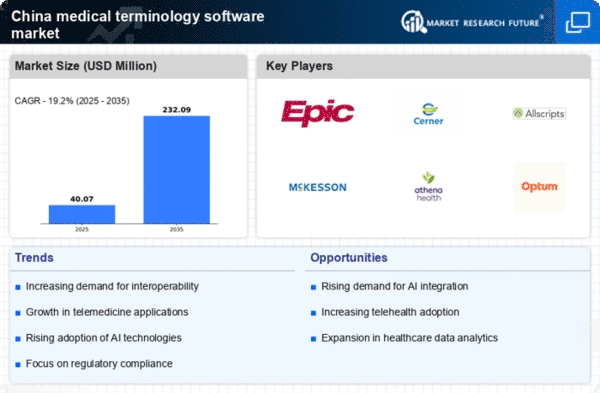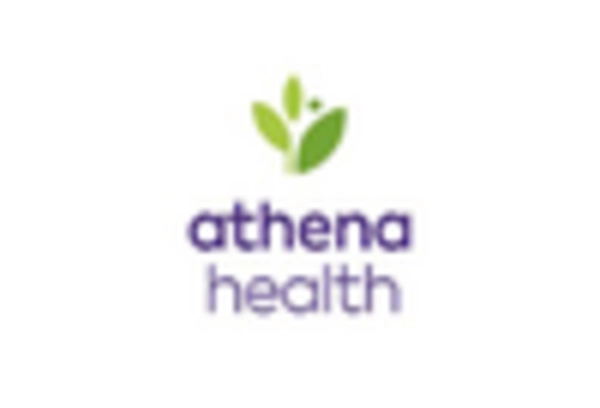Government Initiatives and Funding
Government initiatives aimed at enhancing healthcare infrastructure in China are significantly influencing the medical terminology-software market. The Chinese government has been investing heavily in health information technology, with plans to allocate over $10 billion towards digital health initiatives in the coming years. This funding is expected to facilitate the development and implementation of advanced medical terminology software solutions. Furthermore, regulatory bodies are promoting the adoption of standardized medical terminologies to improve interoperability among healthcare systems. As a result, the medical terminology-software market is likely to see increased investment and innovation, driven by these supportive government policies and funding opportunities.
Growing Emphasis on Data Analytics
The medical terminology-software market is witnessing a growing emphasis on data analytics, which is reshaping how healthcare providers manage and utilize medical data. With the increasing volume of patient information generated daily, healthcare organizations in China are recognizing the importance of leveraging analytics to derive actionable insights. This trend is expected to drive demand for sophisticated medical terminology software that can integrate with analytics platforms. By 2025, it is anticipated that the healthcare analytics market in China will reach approximately $5 billion, further underscoring the potential for growth in the medical terminology-software market as providers seek to enhance decision-making and improve patient outcomes through data-driven strategies.
Increased Focus on Patient-Centric Care
The shift towards patient-centric care is significantly impacting the medical terminology-software market in China. Healthcare providers are increasingly prioritizing patient engagement and satisfaction, necessitating the use of software that can accurately capture and convey patient information. This trend is leading to a demand for medical terminology solutions that facilitate better communication between patients and healthcare professionals. As hospitals and clinics strive to enhance the patient experience, the medical terminology-software market is likely to expand, with providers seeking tools that support personalized care and improve health literacy among patients. This focus on patient-centricity is expected to drive innovation and development within the market.
Rising Demand for Healthcare Digitization
The medical terminology-software market in China is experiencing a notable surge in demand due to the ongoing digitization of healthcare services. As hospitals and clinics increasingly adopt electronic health records (EHRs) and other digital solutions, the need for accurate medical terminology software becomes paramount. This shift is driven by the necessity for improved patient care, streamlined operations, and enhanced data management. According to recent estimates, the healthcare IT market in China is projected to reach approximately $20 billion by 2025, indicating a robust growth trajectory. Consequently, The medical terminology-software market is likely to benefit from this trend. Healthcare providers seek reliable tools to ensure precise communication and documentation in clinical settings.
Advancements in Natural Language Processing
Advancements in natural language processing (NLP) technology are poised to transform the medical terminology-software market in China. As NLP capabilities improve, software solutions can better interpret and process medical language, enhancing the accuracy and efficiency of clinical documentation. This technological evolution is likely to attract healthcare organizations looking to streamline their operations and reduce administrative burdens. The integration of NLP into medical terminology software can facilitate more intuitive user experiences, allowing healthcare professionals to focus on patient care rather than paperwork. As a result, the medical terminology-software market may experience significant growth as organizations adopt these advanced solutions to improve workflow and documentation practices.
















